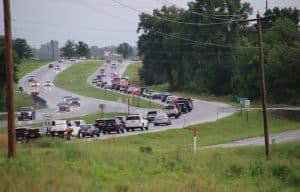New rules for Freedom Lake
Freedom Lake was once again the primary topic of discussion for the Monroe County Zoning Board of Appeals last week following a discussion last month about various issues at the rural Waterloo campground.
February’s meeting saw Frances Gruber, who operates the campground at 5329 Sportsman Road near Waterloo Sportsman’s Club, address the board about several apparent permanent residents as well as a high volume of emergency service calls at the property.
It was previously discussed that Freedom Lake had gained a number of permanent residents – including several veterans – as Gruber wished to help individuals he said were struggling financially.
The board’s key issue with the situation at Freedom Lake was that Gruber’s special use permit does not allow for permanent residency, with the fact these residencies weren’t being taxed as such serving as a further problem.
At last Wednesday’s meeting, the board assessed how Gruber had been dealing with the situation – including making evictions – as was discussed at the previous meeting.
Monroe County Zoning Administrator Chris Voelker gave a rundown of Freedom Lake’s status following a recent inspection. He noted the progress that had been made, with several evictions, a few trailers still in need of moving and one of several decks still in place which Gruber asked to keep in order to use as a trailer dock.
Attorney Jay Huetsch spoke on behalf of Gruber for most of the meeting. After Voelker spoke, Huetsch explained additional evictions are currently in progress, though 30 days notice is necessary as the residents appear to have been paying a monthly lease.
Huetsch noted Gruber’s removal of the permanent residents, noting he had previously misspoke about the number of residents at the campground.
“Permanent residents shouldn’t be out there,” Huetsch said. “My client has gotten rid of the permanent residents. There were not a dozen or 14 as he must have said last time. He confused permanent residents with structures that are permanent.”
Huetsch then went on to say some previously used terms such as camping aren’t specifically defined in county code, though he did offer some definitions provided by the Campground Licensing and Recreational Area Act.
Camping, he said, is the “act of resting or establishing temporary shelter using a tent, cabin, recreational vehicle or other permanent or non-permanent type shelter erected or placed on an area of land.”
Given that and other definitions, Huetsch questioned various aspects of the code and the special use permit – though Monroe County State’s Attorney Ryan Webb contended that the terms do have generally accepted plain meanings which would be acknowledged should they lack a definition within county code.
Huetsch further argued about some of the grey areas and definitions surrounding the situation at Freedom Lake, particularly questioning part of the board’s previous discussion concerning adding a rule to the special use permit mandating that fifth-wheel RVs not remain in a single spot for an extended duration.
“Camping allows a permanent structure,” Huetsch said. “It doesn’t allow living permanently in that structure. … Some of these you can’t move, not easily. Not everybody has a vehicle to move a fifth-wheeler. You’re not gonna move the cabins.”
He also offered additional explanation regarding the high number of calls, noting a substantial number of them involved two individuals who were suicidal.
Other individuals there, Huetsch said, weren’t exactly the problem they had previously been made out to be. Huetsch said he personally knew two of them, a young neighbor who stayed at Freedom Lake on occasion and the daughter of his first legal secretary.
Huetsch suggested the board consider adopting the Campground Licensing and Recreational Area Act while also taking further considerations in regard to a decision on Gruber’s permit.
One rule he recommended was that the board make Gruber keep a daily log of those staying at the campground. He added the three-month limit on staying at the campground was generous.
“We have no problem with that,” Huetsch said. “Actually, I would have started lower. Three months is not a problem, but moving the fifth-wheeler can be a problem.”
Discussion among the board, Huetsch and Gruber then bounced around a number of topics, including the possibility of requiring a seasonal closing of Freedom Lake.
Some on the board argued that those with a large RV at the campground should have the ability to move it, though Huetsch argued some pay to have their vehicle moved as they don’t have the equipment themselves.
It was also mentioned that no more than four such vehicles can stay on the grounds permanently, as a collection of five or more is classified as a mobile home park.
The board also expressed concern about traveling nurses whom Gruber had previously said stay at the campground for an extended period.
Ultimately, the zoning board approved a motion to amend the special use permit, setting a 30-day limit on those staying at the campground with the option for Gruber to reach out to building and zoning for 90-day periods based occupations opportunity.
Further, the amendment placed a limit of four movable trailers to be on the property for more than 30 continuous days, with those four to be identified by Gruber.
The amendment also included that Gruber should keep a log of all individuals for each day, which would be open and available for inspection by building and zoning.
Prior to the Freedom Lake discussion was a far briefer item concerning Derrick and Deidre Gregson, who requested a variance to reduce the front setback to 24 feet for a grain bin for their property at 4526 State Route 159, Red Bud.
There had been a complaint about the erection of grain bins at the property as they are located within the state’s right-of-way near the road, which is 115 feet while bins are 96 feet away.
Derrick, in past correspondence, said Voelker told him a foundation inspection for the grain bins wouldn’t be necessary. Voelker also told the couple to obtain a building permit, though they ultimately didn’t do so.
Also per Derrick’s correspondence, the placement of the grain bins were placed there for a number of reasons including the fact that the space was not tillable land.
The couple also briefly addressed the board in the meeting.
“We admit full negligence by not getting a permit in the first place,” Deidre said. “We could have avoided this. It was just miscommunication between the two of us. We had not intent to not get one, promise. We usual play by the rules.”
The board ultimately voted to approve the setback variance with the Gregsons’ understanding that they would be required to move the bins should the state take issue with them.






